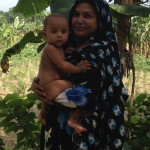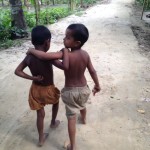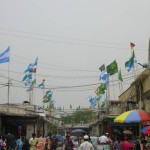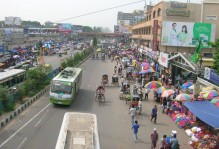When in doubt, eat a mango!
The past few weeks in Bangladesh have been full of culture, rainy villages, and adventures!
My second weekend here, I went with a group of friends on a tour of “Old Dhaka” – the oldest part of the city that was originally inhabited by the Mughal rulers in the 15th century and is now considered slums. We visited mosques and palaces – some curated and some decaying. However, the government is so disorganized and frail here that they have no agency to preserve the old buildings. At one of the palaces, I didn’t even realize I was inside it until I glanced above me and saw the remnants of a beautiful domed ballroom. Beggars and shopkeepers had set up business in the old palace, so it looked like any other slum alleyway. People were living in the towers, their laundry drying in the ancient windows. It was very sad, and it made me grateful that so many US citizens value saving our cultural heritage. In the second week of my internship, my group of interns, three women, was sent to a rural area for a week to observe the loan disbursement and village lifestyle. We lived at one of the thousands of branch offices of the Grameen Bank, with no electricity or bedding, but with lizards who came in through the paneless windows. We spent every morning going to center meetings, where the women turn in their weekly loan installment. We used a translator to ask the women about their micro-businesses, how they got involved with Grameen Bank, and the challenges that they still face. Most of the women had tailoring services, raised livestock, managed vegetable stalls, or owned CNGs (Bangladesh version of a taxi).
- A traditional rural home
- A house built with a Grameen Bank loan. The walls and roof are corrugated tin and there are multiple rooms and a porch.
The Grameen Bank lends to 97% women, but we did get the chance to visit a center meeting that was made up of only men. The particular village was so conservative that women weren’t allowed to leave the house, let alone have a bank account. As a result, the men were the borrowers. If it was so conservative that there couldn’t be a women center meeting, then it was really too conservative for three foreign women to visit. My group was immediately on edge and felt unwanted there. We got more stares than usual, so we were ready to leave pretty fast. In my time here, I’ve grown used to having a constant crowd around me: I don’t feel threatened if there are some women in the crowd, but if the crowd is just men a little red flag goes up and I try to get out of the situation. Still, I wanted to talk to these men since they were such unique borrowers. I asked them if they thought there was any benefit to being a male borrower instead of traditional female. They said that as men, they were more responsible, capable, and intelligent. Ironically, as we were leaving the center meeting, two of the men got in a fight about something and punches were being thrown. This would never happen at a women’s meeting – the women would just talk out the problem. The men think they are more mature? Yeah right!
- Mother borrower and baby
- Inseparable friends
In the afternoons at the village, we met with unique borrowers who took out non-traditional loans, like for getting a college degree. We also met a bank member who had a beggar loan. Thirty years ago, the Grameen Bank gave her a small loan so she could go door-to-door selling small goods instead of begging. It pulled her out of poverty, and now she owns a house, has land to rent, and a grocery store. She was able to provide for her kids, and now she’s a great-grandma with a full and happy house. We got to be good friends with her, and affectionately called her “Granny’. She played with my hair, and we played with her grandchildren. It was quite a big deal in the neighborhood that three foreign women were visiting. The word spread fast, and on the first morning we awoke to find that the village children had climbed the tree next to our second story window and were watching us sleep. In the village, everyone is family and everything is shared. So it was absolutely acceptable that the children came into our private bedroom to watch us get ready. It was funny and cute, but a little creepy.
- “Granny”, the recipient of a beggar loan that took us under her wing.
- One of the little girls that spent her day peeking into our window.
The countryside is beautiful – we were in the banana growing region. The markets were vibrant and the food was delicious. I get a meal of “street food”, which is usually samosas or dahlpuri, for the equivalent of 20 cents in US dollars. In the village I also fell in love with the Bengali version of ice cream, called kolfee, which is yogurt based. A wise guy once told me that the first step to loving a place is to love their food, and entire impressions of a city can be formed in one meal. To be honest, most of the time I don’t love the food. Other than mangos, there is no fresh produce and everything is fried. I do love the sweets, which may be the food that makes me love the country.
Although the bank is doing a lot of good, I’ve been a little bit disappointed in some of the methods of the bank. From the outside, the system looks flawless. However, after visiting the village and talking to the women, I started to piece together the holes in the system. For example, the bank says it gives 97% of the loans to women, as stated above. While this is technically true, many of the women I talked to said that they gave their loan money to their husbands or sons to run a business, so the women were not directly benefiting from the loan. I inquired about this to many people, including the head of the bank, and got essentially the same answer. I’m told that the women are still empowered because the men are required to go through their wives or mothers to get the money, and the women are the ones going to the weekly meetings. This means that the man is encouraged to respect the woman because she is controlling the flow of money. I don’t completely buy this reasoning – I don’t believe that it empowers women, and no one knows what is going on behind closed doors in the household. Still, having money for the man to build a business is better than having no money at all.
- Meeting with Mohammad Yunus, founder of the Grameen Bank and winner of the 2006 Nobel Peace Prize.
- If you aren’t rooting for Brazil or Argentina, you don’t belong here.
It was enriching to be immersed in the village for a week. I got a much better understanding of the social structures and bank policies that make the Grameen Bank so successful. I realized how important it is that the bank comes right to the doorstep of the village houses. This means the women hardly have to take a break from their work to do business. The bank officer is constantly aware of the issues that come up in the village, and the women grow close bonds to support each other when needed. At first I was surprised that the Grameen Bank has not expanded mobile banking for their programs. Bangladesh is the cheapest country to have a cell phone in, and the infrastructure is already built up. Mobile banking would streamline the loan process, but it would eliminate the community factor that the bank thrives on. The fact that the community of women meet with a loan officer every week is what strengthens the program.
Comments are currently closed. Comments are closed on all posts older than one year, and for those in our archive.












Fantastic story! Very enlightening!